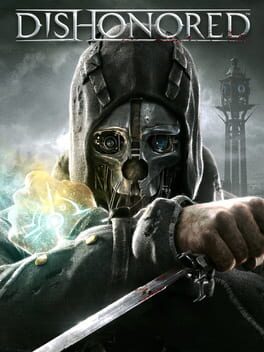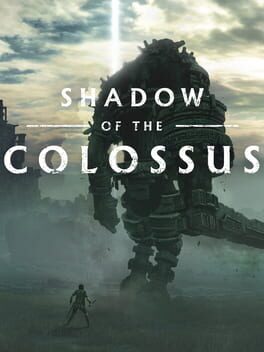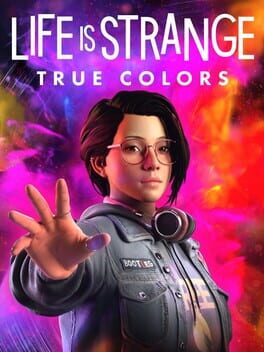GHOSTWORLDULTRA
Bio
2 stars is neutral; I don't like half stars so I'm not going to use them.
I'm going to try to talk about games not like I'm coldly evaluating the specs of a new SUV but like they're actual works of art (which they are and deserve)
2 stars is neutral; I don't like half stars so I'm not going to use them.
I'm going to try to talk about games not like I'm coldly evaluating the specs of a new SUV but like they're actual works of art (which they are and deserve)
Badges

2 Years of Service
Being part of the Backloggd community for 2 years

Noticed
Gained 3+ followers

Liked
Gained 10+ total review likes
Favorite Games
084
Total Games Played
000
Played in 2024
000
Games Backloggd
Recently Reviewed See More
I like that the background "story" for this, rather than being about the supernatural or spiritual collapse of a decadent world, is instead the collapse of a family. There's a distinct pathos to it that I find fascinating.
Having said that, it really is the "power metal" FromSoftware game compared to the relentless black, doom, and gothic metal of their previous entries, and with that comes both good and bad. We get gloss, polish, aesthetic splendor, but also cheesiness, sameness, and an emotional experience that lacks maturity and complexity. Its mysteries aren't opening up to me in the same way that Dark Souls, Bloodborne, and Sekiro's did.
And for my final critique, I'll be absolutist. The core game has gained almost nothing from the shift to the open world. I feel strongly that the game would be vastly different if it were confined to the Metroidvania world design of its predecessors, but also that it would be tighter, more streamlined, and more enjoyable of an experience.
Having said that, it really is the "power metal" FromSoftware game compared to the relentless black, doom, and gothic metal of their previous entries, and with that comes both good and bad. We get gloss, polish, aesthetic splendor, but also cheesiness, sameness, and an emotional experience that lacks maturity and complexity. Its mysteries aren't opening up to me in the same way that Dark Souls, Bloodborne, and Sekiro's did.
And for my final critique, I'll be absolutist. The core game has gained almost nothing from the shift to the open world. I feel strongly that the game would be vastly different if it were confined to the Metroidvania world design of its predecessors, but also that it would be tighter, more streamlined, and more enjoyable of an experience.
My hot take is that this is actually a really good RPG--it's just very different. One thing that stands out to me is how Night City is probably the highest-budget, most detailed backdrop I've ever seen in video games. The story here is really about selfhood, entropy, and external manipulations. To paraphrase Mike Pondsmith, cyberpunk really isn't about saving humanity or changing the world or anything, but about saving yourself. The whole story is ultimately about V struggling to reclaim agency that Arasaka, Night City, Johnny Silverhand, a poisonous gig culture, etc. has stolen from them. At its best, the path story is one about how choice and agency are constantly denied to Night City's inhabitants, then giving the player the opportunity to kick and flail and beg to be a person again. I think it's a very beautiful story.
As an open world it's carried by beauty and flow (save for when that flow is interrupted by bugs) but is ultimately really counter-immersive. If Night City is meant to be this detailed place for realistic human behavior and meaningful engagement, then countless open world objectives dotting the map, encouraging you to play murdercop for thirty minutes to an hour to grind out a level or two is seriously destroying that objective. It is aided by a few gigs and notes that seem to draw everything together into one big meta-story about Night City itself, but it's got major problems. It is hard to immerse oneself in a city that also is, additionally, a double-jump-hacking-katana-wielding murder playground. Eventually, the player is going to just speed between murder objectives, double jumping over civilians, laughing at crude advertisements, and racking up a quadruple digit body count.
I think the endings are the strongest point. I am baffled by people who insist that because there is no perfect ending, the game is pointless. V being doomed is known from the start--all that you do is desperation and insistence to not fade away. Enshrining yourself into Night City legend in Johnny's preferred ending is cold comfort--empty, in the end, because V changes nothing. Trusting Arasaka is the grim supplication to the capitalist order, admitting that you have no plan for altering the world. Even the Panam ending, often called the best, only imagines a way out of the capitalist order by simply abandoning hope for altering it altogether.
Perhaps the main story's only real weakness that still frustrates me is an inability to imagine what the alternative to Night City's order could be. But making a game about that would necessitate a more complex political statement--one that would have to be more than "shoot everyone in Arasaka" or "commit to Arasaka" or "fuck everything about this." The alternative, of course, is a political aim that unites the people of the city and all their power under the banner of a representative party that could feed and house everyone and dismantle the corporate overlords. Doing so would be, necessarily, socialist, though, and it frustrates me that even in this cyberpunk fantasy world, we are still unwilling to openly imagine an alternative to capitalism.
This is a good video game. Its failures are not actually that special in the grand scheme of things. It's thoughtful, kinetic, gorgeous, but also buggy and dissonant and kind of shallow. I can name at least fifty games that are just like that. Why are we acting like this is a special case?
As an open world it's carried by beauty and flow (save for when that flow is interrupted by bugs) but is ultimately really counter-immersive. If Night City is meant to be this detailed place for realistic human behavior and meaningful engagement, then countless open world objectives dotting the map, encouraging you to play murdercop for thirty minutes to an hour to grind out a level or two is seriously destroying that objective. It is aided by a few gigs and notes that seem to draw everything together into one big meta-story about Night City itself, but it's got major problems. It is hard to immerse oneself in a city that also is, additionally, a double-jump-hacking-katana-wielding murder playground. Eventually, the player is going to just speed between murder objectives, double jumping over civilians, laughing at crude advertisements, and racking up a quadruple digit body count.
I think the endings are the strongest point. I am baffled by people who insist that because there is no perfect ending, the game is pointless. V being doomed is known from the start--all that you do is desperation and insistence to not fade away. Enshrining yourself into Night City legend in Johnny's preferred ending is cold comfort--empty, in the end, because V changes nothing. Trusting Arasaka is the grim supplication to the capitalist order, admitting that you have no plan for altering the world. Even the Panam ending, often called the best, only imagines a way out of the capitalist order by simply abandoning hope for altering it altogether.
Perhaps the main story's only real weakness that still frustrates me is an inability to imagine what the alternative to Night City's order could be. But making a game about that would necessitate a more complex political statement--one that would have to be more than "shoot everyone in Arasaka" or "commit to Arasaka" or "fuck everything about this." The alternative, of course, is a political aim that unites the people of the city and all their power under the banner of a representative party that could feed and house everyone and dismantle the corporate overlords. Doing so would be, necessarily, socialist, though, and it frustrates me that even in this cyberpunk fantasy world, we are still unwilling to openly imagine an alternative to capitalism.
This is a good video game. Its failures are not actually that special in the grand scheme of things. It's thoughtful, kinetic, gorgeous, but also buggy and dissonant and kind of shallow. I can name at least fifty games that are just like that. Why are we acting like this is a special case?
In the best and worst ways this is the "sellout" Life is Strange. Everything that the previous titles have been is included here: A coming-of-age story with a moderately superpowered protagonist told against beautiful American vistas and an indie rock soundtrack. Half mystery and half tearjerker, if you've played the previous titles you will recognize everything here and probably enjoy it, too. Alex is a good protagonist and her being an adult rather than a teen makes her feel freer and comfortable, less cryptic and awkward. The way she sees and interacts with the gorgeous Haven Springs is, all at once, humorous, sad, and sweet. I enjoyed its mystery and felt its sadness, even though I could map out its every turn from Chapter One.
What's missing? A storm that will kill everyone, a true thesis on life and death, real moral quandaries, a darkness to the town that can't be shaken, a romance with stakes and drama, an unforeseen twist... it lacks an identity of its own beyond the conventions of its series.
Though Life is Strange 2's political message was muddied and lacking complexity, I vastly preferred its central drama and its heartbreaking no-perfect-answers conclusion. And nothing in this series has come close to the third-act psychotic meltdown, arcane symbolism, and real heart that the first in the series had. If True Colors represents the future of the series, it will have its fans, but it seems we've stopped innovating on the formula.
What's missing? A storm that will kill everyone, a true thesis on life and death, real moral quandaries, a darkness to the town that can't be shaken, a romance with stakes and drama, an unforeseen twist... it lacks an identity of its own beyond the conventions of its series.
Though Life is Strange 2's political message was muddied and lacking complexity, I vastly preferred its central drama and its heartbreaking no-perfect-answers conclusion. And nothing in this series has come close to the third-act psychotic meltdown, arcane symbolism, and real heart that the first in the series had. If True Colors represents the future of the series, it will have its fans, but it seems we've stopped innovating on the formula.







